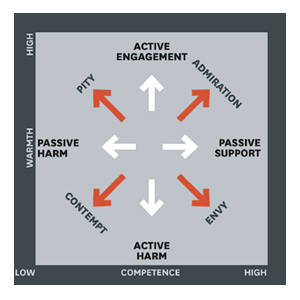[Photograph by Scott Maxwell under Creative Commons]
Do you consider yourself a leader? Of course you do, because you are highly competent:
-
Whenever your enterprise faces an issue, you take the initiative to propose a solution.
-
Whenever your colleagues approach you with a problem, you offer very effective solutions.
-
You are task-driven and do not brook any nonsense or incompetence from your colleagues.
-
As a caring boss, if you spot any professional weakness among your colleagues, you do not hesitate to correct them then and there.
Yet, despite your high level of competence, do you face the problem that your colleagues are not willing to be led by you? They do not wish to affiliate or engage with you and worse, they resent you!
Watch a video of this episode or continue reading
Episode 5: New rules of business
Legions of professionals face this very problem.
Let me share the root cause of the problem you face: you.
To resolve this conundrum, let me share a graph. The X axis represents competence, while the Y axis represents warmth.

(Source: Amy Cuddy, Susan Fiske, and Peter Glick – HBR July – August' 2014)
Place yourself on this graph. Your traits indicate that you are high on competence, but low on warmth. Hence, you occupy the 'envy' quadrant.
Envy is an emotion that generates animosity; it causes pain, unhappiness and resentment towards the envied person. It also generates a feeling of inferiority in the person experiencing this emotion. So strong is the feeling that at times it culminates in a display of hostile behaviour towards the envied person. That is what is happening to your colleagues. They envy you, so you generate all the above emotions in them. Therefore, they do not wish be led by you.
These same traits that you posses in abundance will do justice to a manager whose key responsibility is to control and direct employees to achieve the objectives of the enterprise.
Now let us revisit the graph. A manager who is high on competence but low on warmth is envied, while a leader who scores high on both warmth and competence is admired.
So what should you do?
Simple. Move from the ‘envy’ to the ‘admired’ quadrant.
You are already high on competence. Acquire skills that will help you score high on warmth and you will transform into a leader.
For that, you could incorporate these simple suggestions in your day-to-day working and witness the transformation.
-
Your choice of words: Make ‘please, ‘thank you’ and ‘may I?’ an integral part of your conversation.
-
Delete ‘I’ and substituting it with ‘we’: Leaders do not think in terms of ‘I’; they think only of ‘we’.
-
Learn to say ‘I am sorry’: If you make a mistake, learn to say, ‘I am sorry’ without being asked to say so.
-
Be appreciative, but only in deserving cases: Take a leaf from Sir Alex Ferguson’s career. He had to manage multimillionaire football stars like Cristiano Ronaldo, David Beckham, and Wayne Rooney among others. To motivate them he used two words: ‘well done’. He believes that there is nobody in the world who does not like to hear these two words. You too should use Sir Alex’s formula for motivating your colleagues. But use it sparingly and in deserving cases only. Excessive use can diminish its value.
-
Listen: When your colleagues are communicating, listen to them. Do not do it in compete silence. Punctuate it with 'yes' or 'hmm' to indicate that you are indeed listening and not merely hearing. If you have not understood a point, ask your colleague to explain it again. Remember to summarize important conversations to make sure that you have understood what has been communicated.
-
Be patient: This will make you appear warm and friendly.
-
Body language: Let me share a secret with you. Non verbal communication (NVC) is more impactful than verbal communication. People unconsciously pick up NVC and form opinions based on it. So, learn the basics of body language so that you do not send out any unintended message. Instead, leverage it to score higher on warmth.
-
Eye contact: Maintain eye contact when you are speaking. This will make you appear more honest.
-
Hands: Keep your palms facing up when making a point. This will indicate that you are requesting for your ideas to be heard and accepted. The reverse, palms down, is a sign of dominance. Avoid this posture.
-
Pointing a finger: Do not do it during discussion or while making a point. It is tantamount to accusing a person.
-
Head down: If your colleague is speaking to you and you tilt your head down, it will indicate that you are not interested, and you disapprove of the point being made. So keep your head up and look into the eyes of the colleague.
-
Speak slowly. When you speak at a fast pace you run the risk of being incoherent and appearing nervous.
-
Smile: When you smile, you appear more approachable, more likeable and more confident.
-
Adopting these simple suggestions will help you will score high on warmth and given that you are already high on competence, you will transform from being ‘envied’ to being 'admired'. And your colleagues will willingly follow you. Once that happens you will become a leader.
I see a smile of relief on your face. But like all good corporate leaders, you are a strong believer in the simple axiom: what cannot be measured cannot be improved. So is there some way to measure whether you are indeed being admired by your colleagues?
I am sure your enterprise follows the 360 degrees appraisal system. During appraisal request your colleagues to score you on two questions:
-
Do you feel good in my presence?
-
When you face a problem do you feel confident to confide in me?
If the answer to both these questions is yes, you can certify yourself as an "admired leader".
Congratulations!
If you have a question, write in to askrajesh@foundingfuel.com.



